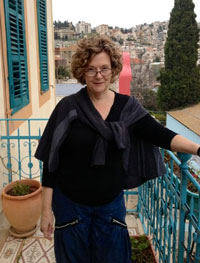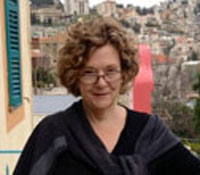by Rina Lazar (Israel)
 As an Israeli and a member of IARPP I found myself during the last war feeling so pained and confused and alone among my beloved friends, colleagues, and family, that I took on the mission—and I really do mean mission—that I was asked to do, to moderate a special online discussion talking about Israel and Gaza in psychoanalysis. The launching of this listserv discussion was a prompt and specific response from IARPP to a need that arose after Jeremy Safran posted Eyal Rozmarin’s paper, “Talking about Gaza in Psychoanalysis,” on our listserv. I added the name of Israel to Eyal’s title since Israel is always there, deep inside.
As an Israeli and a member of IARPP I found myself during the last war feeling so pained and confused and alone among my beloved friends, colleagues, and family, that I took on the mission—and I really do mean mission—that I was asked to do, to moderate a special online discussion talking about Israel and Gaza in psychoanalysis. The launching of this listserv discussion was a prompt and specific response from IARPP to a need that arose after Jeremy Safran posted Eyal Rozmarin’s paper, “Talking about Gaza in Psychoanalysis,” on our listserv. I added the name of Israel to Eyal’s title since Israel is always there, deep inside.
This online discussion was a new experience for all of us, organizers and participants alike, and a risky one. Talking about politics is not the best way to be on friendly terms with virtual and real companions, especially in times of war. It is hard to articulate one’s thoughts in a way that can be heard by others, and to really listen to other voices.
We launched this online discussion on the 15th of August without any predetermined structure or time limit. Very soon into it there were around 210 participants in this group. Most were silent participants, though this silence was a very active state of mind. During our discussion we talked about ideas of homeland, identities, loyalty and attachments, perpetrators and victims, freedom fighters and fundamentalism, right and wrong, and fears and threats. Other ideas our group took up included history and time, the “present moment of the past,” trauma, “chosen trauma,” “painful privilege,” nationality, the Holocaust, and the Nakba. Our group was comprised of professionals and individuals with very relevant personal histories, including Jews, Christians, and one Palestinian.
We grappled with understanding our involvement in this bloody place. Why especially is Israel and Gaza such a focal point for so many people around the world? One can find evil and misery anywhere, so what draws us all to this “Promised Land,” even those who have never been there or have decided to leave? Why? What is the meaning of being “chosen,” and how does it feel to be a non-Jew native of this place, the “unchosen”? What does it mean to be stuck in the midst of religious wars in the beginning of the 21st century?
Looking back at the process we went through, I find it helpful to share excerpts from some of the many thoughtful and impactful statements made during our discussion:
“I feel such deep gratitude for the amazing space that this virtual conversation has opened.”
“I have asked myself if it’s mad or courageous to launch such a psycho-political e-list in the midst of another war in the Middle East, and concluded that it’s both.”
“I too am very grateful for this opportunity for a sincere and close discussion, sometimes pretty heated, which does not hide behind professional cliché. I loved the impolite and rough turns it took sometimes, and the ways we found to get back to a benign dialogue. (By the way, do “politics” and “polite” come from the same word stem? Seems quite reasonable.) It’s also fascinating for me to see the shift we took in the last posts toward deep reflection into the process unfolding between us. I guess it couldn’t have happened without us going through these misunderstandings, entanglements and resolutions. Again… it makes me understand the necessity to sustain and survive relational clashes in order to gain the capacity to reflect.”
“Like several of you, I have the feeling that something has changed. I’m sure it’s partly the cessation of ‘all-out destructiveness’ and acute anguish that cried out for ‘a voice like thunder and a tongue to drown the throat of war,’ as Blake wrote, long ago. The need for a safe place to discuss its personal impact on us (directly or through identification with our patients or ‘our people’) may therefore be diminishing. Thank goodness for that!”
“I have become mellow…fluffy…spongy….whatever… I began participating in the midst of the fighting, with a resolve to represent, in this ‘liberal, leftist, non-understanding, highly tilted, non-patient (I mean having no patience), on the verge of being anti-Semitic (by Semites too)’ forum, a ‘proud non-apologetic Israeli-Jewish’ stance…But now I got mellow!…I feel we went through something here.”
I apologize for quoting without naming the authors of these posts. These are a few voices from our large group, very personal representatives of others we speak for and through. We related to each other and to our context in real time. I thank all of the subscribers for being there and IARPP for being such a vibrant and holding frame for our minds in times of terror. Time will tell how we’ll move on. We have traveled a long way since we began.
“The past is never dead. It isn’t even past.” –William Faulkner [1]
Rina Lazar
Ramot Naftali 9
Tel Aviv 69278
Israel
rlazar@post.tau.ac.il


